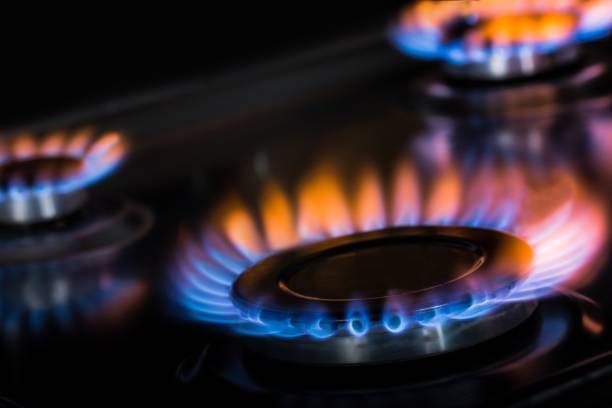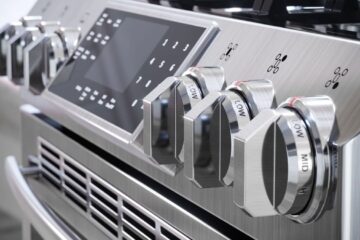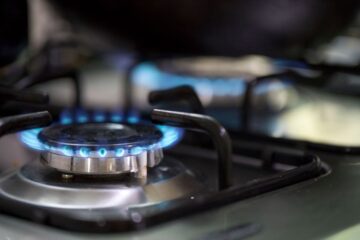We are not joking when we say that this could save your life! Many of us have experienced the terrifying feeling of having our stove suddenly blow up and watching our homes burn down.
That’s why we wanted to write this article on how to prevent a stove from blowing up. Hence, you never have to go through that terrifying experience again! While there isn’t a surefire way to prevent it from happening altogether, there are some things you can do to help minimize the chances of it happening to you!
Can A Gas Stove Explode?
Modern gas stoves are designed to prevent explosions, but they are not infallible.
Gas stoves can explode if they are not installed properly or if they have been tampered with. The most common cause of a gas stove explosion is a build up of carbon monoxide in the pilot light area.
Can An Oven Explode?
Yes, you can get an oven to explode.
But it’s unlikely. Electric ovens can explode – even though they don’t use gas. That’s because the heating element is connected directly to the power source (the wall outlet) and not to a gas line.
A gas line is required for an explosion because when something ignites the gas in a confined space like a kitchen appliance or space heater, it will release all that energy as heat and cause an explosion. This can happen even if there isn’t any gas involved at all!
What Can Cause Stove Explosion?
If you’re wondering what can cause a stove explosion, the answer is usually a build-upbuild-up of gas. When this happens, the stove can become a dangerous fire hazard. In this article section, we’ll look at what can cause a stove explosion.
1. Internal gas leaks
Internal gas leaks are one of the most common causes of stove explosions and can be hard to detect. The first thing to do is to check for any possible gas leaks. If a stove leaks, it will usually have a noticeable build-upbuild-up of carbon monoxide in the room or throughout the house. You may also notice that your stove pops and bursts open when it fails to ignite properly.
If you suspect your stove leaks, remove all the burners and remove the burner grates from the stovetop so that they’re not in contact with gas or electricity. Then let the area around the stove cool down before you light anything up again.
If you find no leaks after testing all of your appliances, check to see whether there is any corrosion on your gas lines and pipes. Corrosion can cause internal corrosion within your appliance and external corrosion on its outer surface, leading to leaks throughout your home.
2. Exposed gas pipes
Exposed gas pipes are common causes of stove explosions. Gas is highly flammable and will burn if it is exposed to ignition sources, such as open flames or sparks from a hot surface.
Suppose the gas pipe is not adequately insulated. In that case, it can become dangerously hot and explode due to its high flammability level. Gas pipes in a kitchen often have no insulation because they are hidden behind appliances or wall panels.
If one of these pipes bursts, it can cause an explosion that can injure or kill anyone nearby when the gas escapes out of the pipe and ignites nearby combustible materials like curtains or clothes.
Gas leaks may also occur in the electrical wiring in your home, which could ignite other areas of your house. The best way to prevent these types of accidents is by undertaking regular safety checks around your home so you can catch any potential problems before they become serious problems.
3. Water damage
A leaky or cracked appliance usually causes water damage. The water can be coming from the floor, the sink, the dishwasher, the stove, or somewhere else. Even if you don’t see water on the floor, it could be hiding in a crack between your flooring or behind appliances.
To prevent stove explosion due to water damage, you must check for leaks. You can use a flashlight to see inside cabinets and under appliances for any cracks or gaps where water could be entering your home. If you do find a leak, take steps immediately to fix it before it causes further damage.
4. Faulty burner equipment
A stove can explode because of faulty burner equipment. The burner, or heating element, is the part of a stove that produces heat. If it’s not working correctly, it can result in severe injury or even death.
Burners are designed to handle high temperatures, but if they aren’t designed correctly and meet safety standards, they can malfunction. This can cause an explosion and fire if you’re using hot water on high heat when the burner malfunctions.
You may have heard about a range hazard called “thermal runaway,” when the flame becomes so hot that it causes an explosion or fire. If your stove has a broken burner, it’s possible for this to happen because the burner isn’t designed to handle high heat levels.
5. Faulty Venting
The most common cause of stove explosion is faulty venting. The stove vents must be vented to prevent carbon monoxide from building up in the house.
If the stove has a chimney, it must have vents in it as well. The vents should be installed according to code, and they must be checked regularly for proper operation. If these requirements are not met, the stove may explode and injure you or someone else in your home.
A faulty venting system can be caused by several problems, including:
Improperly sized chimney or flue (these must be at least 3 inches larger than the size of the stove)
Faulty flue damper (this is commonly found on gas stoves)
The damaged or missing chimney cap
Damaged or missing flue cap (if this occurs, there will be no way for air to enter your home)
6. Faulty Construction
If your stove has a faulty construction, it may be prone to exploding. The gas line is not sealed correctly and insulated. This could be caused by a lack of insulation around the flame tubes, which allows heat from the burner to escape and reach the gas line directly. If this happens, it can lead to an explosion in your home’s cooking area or another room where flammable materials are nearby (such as curtains).
7. Damaged Fireplace
Another common cause of stove explosions is damage to your fireplace’s chimney flue. If this happens, you will have no way of venting out any fumes from your stove that may be trapped inside it when it explodes. You’ll need professional help to repair this damage and prevent further issues from happening!
Things To Do On How To Prevent A Stove From Blowing Up?
These things may prevent gas stove explosion or your stove from blowing up.
1. Always try to keep the stove clean
Always try to keep the stove clean. Use a damp cloth or sponge to wipe off any dirt or debris caked on the stove’s bottom.
The easiest way to prevent a stove from blowing up is by keeping it clean and free of all dust and dirt. In addition, you should always use high heat when making your food so that you do not have any problems with smoke or flames from your kitchen appliances.
2. Use a fire extinguisher
A fire extinguisher is a great way to prevent a stove from burning your house. When you use a fire extinguisher, the pressure of the air can stop the gas and prevent it from igniting. This can be especially useful when cooking with gas or natural gas.
If you have an old stove that has been used for many years, there is a chance that it will eventually blow up and catch fire. You may not be able to tell that your stove is about to explode because it doesn’t look like much is wrong with it. But in reality, something is going wrong inside your stove, which could cause severe damage to your home if left unchecked.
3. Unplug the electrical appliances nearby
This is an essential step to take. It would help if you unplugged all the electrical appliances nearby from the stove when you are using it. The reason is that when you have an electric appliance plugged into an outlet, it will draw power from that outlet and cause a surge in power, damaging other electrical appliances in the area. If you fail to unplug these devices, then there is a high chance that your stove will blow up as well.
4. Put out a grease fire with baking soda
If you have an open flame, whether it’s in your kitchen or on the grill, you’re going to get some heat. That means that you need to be able to put out a grease fire fast. Baking soda is one of the most effective tools for doing this.
It’s non-toxic and has a chemical reaction with fat and oil, making it act like oxygen and quickly burn up the fire. You can use it by itself or mix it with water or vinegar to add more flavor. Just remember that baking soda is not water-soluble, so it won’t work as well if there’s any moisture around it.
5. Use a multipurpose fire extinguisher for an electrical fire
When you have an electrical fire, use a multipurpose fire extinguisher to put out the flames. The best type is one that can be used on electrical and chemical fires. This will help the situation considerably.
If you cannot get a fire extinguisher within seconds, try using water from a garden hose or bucket. However, if this does not work, you may consider calling for help as soon as possible.
6. Avoid water for any type of fire
Avoid water for any type of fire. If you have a gas stove, turn off the gas before opening the door so that any gas can’t leak out and cause an explosion.
If you have a wood-burning stove or fireplace, make sure that there are no hot coals or embers in the area where your stove is located. This can cause a fire if it’s not extinguished correctly.
If your stove has a pilot light, keep it lit at all times unless you use it. This will prevent it from blowing up and possibly injuring someone and causing damage to your home/building.
7. Cook with full care and precautions
The other thing to do is to cook with full care and precautions. Always be cautious when it comes to the stove, especially if you are cooking a high-temp dish or cooking foods that may burn quickly.
First, ensure your stove is turned off before you do anything with it. If you leave it on, it can cause a fire, leading to severe damage or harm.
Second, never leave a pan on the burner for too long. This will cause them to overheat and possibly melt down into the space of your oven or other heater space.
Third, suppose you have a glass-top stove top or an induction stove top (the latter is an excellent investment). In that case, use only silicone baking pans on these stoves because they won’t allow food spills under hot temperatures like cast iron pans.
8. Choose the correct range hood method
Choose a range hood method that is appropriate for your stove to prevent the stove from blowing up. For example, if you have an electric stove and do not have an exhaust fan or other means of venting the fumes out of the air, you need to install a gas range hood.
However, if your stove is electric, installing a stainless steel exhaust fan is best because it will help to vent all of the toxic fumes and smoke. The fan should be installed so it can be turned off and on quickly. The fan should also have a thermostat to operate at its lowest possible temperature when not in use.
Related Queries
How To Prevent Gas Stove From Turning On?
If you are experiencing problems with your gas stove turning on, you may wonder how to prevent it from happening again. Fortunately, there are several ways to keep your gas stove from turning on when you don’t want it to.
First, make sure that all valves are closed. This can be done by checking each valve individually or looking at the main valve and checking if it is closed.
If you have an electric stove, ensure all controls are in the off position before starting to cook with gas. You may also want to turn off the pilot light for any burners that aren’t currently being used and then turn them back on when cooking begins.
If you have a gas oven, ensure it has been turned off before using other appliances in your home or kitchen. Also, check for leaks around your stovetop or oven and repair any damaged parts as soon as possible, so they don’t cause more damage in the future!
How To Stop A Stove From Clicking?
If you’re trying to stop your stove and oven from clicking, you can try a few things.
First, make sure that the door is closed and latched properly.
Next, look down at the bottom of your range or oven and see if there’s any dirt or debris on the bottom. If you can see any grime build-upbuild-up there, try cleaning it out with a damp sponge or cloth.
If these don’t work, try turning off the power to your range/oven by unplugging it from the wall outlet. If that doesn’t work, try taking out all the burners on your range or oven and putting them back in again, one at a time, until you find the one causing the problem.
Finally, if none of these steps help, contact an appliance repair professional immediately!
How To Prevent Smoke From Wood Burning Stove?
Like most people, the first thing you’ll do when using a wood-burning stove gets some chimney or vent pipe to prevent smoke from escaping into the room. But there are other ways to keep your home safe from unwanted smoke.
Here are some tips:
First, make sure that your stove is installed correctly and balanced. It will create more smoke and hurt the environment if it isn’t.
Second, ensure that you have enough room around the stove to allow for airflow—the less air in the room, the more smoke there will be. Make sure there are no curtains or other objects blocking air flow anywhere in your home!
Thirdly, use natural materials such as cork or wood shavings for filters instead of paper ones that can catch fire easily if too much heat builds up inside them. This will also help reduce allergens such as dust mites, mold spores, and bacteria in your home’s air quality!
How To Prevent Stove From Getting Dirty?
It is essential to clean the stove top thoroughly. This will help you to prevent it from getting dirty and also help you to make sure that your food will be cooked properly on the stovetop.
There are a lot of things you can do to prevent your stove from getting dirty. Here are some ideas:
-Always keep food in an airtight container when not cooking. This will help keep the food fresher and safer.
-If you’re using plastic wrap, always make sure the plastic is tightly wrapped around the food so that no air gets trapped under it.
-When cooking, make sure you use a lid on your pan or pot so that no steam can escape while it’s cooking.
-Never leave your stove unattended while it is being used. If someone else wants to use it, let them first and then clean up after them!
There are some things that you can do to keep your stovetop clean, such as:
– Wipe the stove with a damp cloth or sponge after every use. This will help remove any leftover food particles that may have been left behind when you cooked anything on it.
– Use a brush or scrub pad to remove stubborn stains and dirt from the surface of your stovetop every few weeks. It would help if you also kept this area of your kitchen clean by keeping it away from any spills that might get into it. If there is a spillage, make sure that you clean it off immediately so that it doesn’t become dirty again!
How To Prevent Stove Fires?
Stove fires are a genuine danger. The National Fire Protection Association estimates that stoves cause over 20% of all home fires. If you have a stove, you need to take steps to keep your family safe.
There are many things you can do to prevent stove fires:
- Never use an open flame on your stovetop or oven, even if it’s turned off (this includes keeping the oven door open).
- Don’t leave anything that could catch fire in your stovetop or oven—including matches or lighters—for extended periods.
- Ensure all pilot flames are out before turning off your stovetop or oven. Ensure there are no open flames when you turn back on the stovetop or oven again (this includes turning back on after closing the gas valve).
- Make sure that flammable materials aren’t left near the burner area of your stovetop or oven (like newspapers), as this can cause an unsafe situation if they’re thrown onto hot surfaces during cooking activities (like boiling water).
How To Prevent Wood Stove From Smoking?
Wood stoves are a great way to heat your home. They’re relatively inexpensive, and they burn wood more efficiently than other forms of heat. That said, it is essential to keep your wood stove from smoking.
Why Does My Wood Stove Smell Like Smoke?
If you have a wood-burning stove and it’s giving off a foul-smelling smoke, there are some things you can do to help prevent this from happening again.
First, check that your chimney is clean and free of debris. You should also ensure that there aren’t any cracks in the bottom of the chimney where smoke could leak out. If these issues are present, you may want to consider having them repaired or replaced before continuing with this process.
Next, check that your stove is adequately ventilated by opening all the doors on top and bottom (including inside). This will allow airflow into your home so that no unwanted odors can accumulate inside over time due to a lack of ventilation (or excessive smoke).
Finally, try using an air freshener around your stove area if necessary; this will also help mask any unpleasant odor from inside the house.
The Final Words
While the risk of something happening to your stove is very low, it is still a risk. Stove explosions happen, especially when using an old stove or the wrong size burner for a pot. We hope that by reading this post, you’ll be able to prevent a stove from exploding. We are always excited when we can provide helpful tips for our readers.
Please share your thoughts with us if you have any other questions or concerns about safety. Thank you for reading. We are always excited when one of our posts can provide helpful information.




